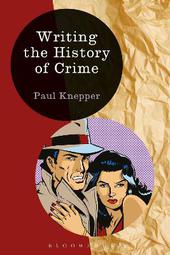
|
Writing the History of Crime
Paperback / softback
Main Details
| Title |
Writing the History of Crime
|
| Authors and Contributors |
By (author) Professor Paul Knepper
|
| Series | Writing History |
|---|
| Physical Properties |
| Format:Paperback / softback | | Pages:248 | | Dimensions(mm): Height 234,Width 156 |
|
| ISBN/Barcode |
9781472518521
|
| Classifications | Dewey:364.0722 |
|---|
| Audience | | Tertiary Education (US: College) | |
|---|
|
Publishing Details |
| Publisher |
Bloomsbury Publishing PLC
|
| Imprint |
Bloomsbury Academic
|
| Publication Date |
17 December 2015 |
| Publication Country |
United Kingdom
|
Description
Writing the History of Crime investigates the development of historical writing on the subject of crime and its wider place in social and cultural history. It examines long-standing and emerging traditions in history writing, with separate chapters on legal and scientific approaches, as well as on urban, Marxist, gender and empire history. Each chapter then explores these historical approaches in relation to crime, paying particular attention to the relationship between theory and the interpretation of evidence. Rather than a timeline for the historical appearance of ideas about crime or a catalogue of the range of topics that comprise the subject matter, Writing the History of Crime reveals the ideas behind crime as a subject of historical investigation; it looks at how these ideas generate questions that may be asked about the past and the way in which these questions are answered. This is a crucial analysis for anyone interested in the history of crime, the historiography of social history or the art of history writing more broadly.
Author Biography
Paul Knepper is Professor of Criminology at the University of Sheffield, UK.
ReviewsThe evaluation, breadth, depth and chronology of subject matter and integration of commentators' perspectives (past and present) is astounding ... The embedded knowledge and cognition displayed here is humbling and could only have been produced by someone who is most genuinely and assuredly not just a crime history specialist but an 'expert crime history expert'; Knepper therefore more than deserves his place amongst the literary greats and academics he references ... The book is an outstanding compendium of the history of crime and the criminal justice process ... [It] is therefore the 'go to' book and 'must read' for not only those starting out on their journey to study and research the history of crime, but for all of us interested and engaged in this work. * History * Knepper's book is impressive in its extensive knowledge of international English-language research. It is clearly structured with an eye towards the essentials, and is successfully didactic in its manner not least due to the summaries at the end of each section. ... As an initial introduction to the topic, this book is highly recommended. * Neue Politische Literature (Bloomsbury translation) * Engaging and well informed, Paul Knepper's Writing the History of Crime synthesizes a large, fragmented body of scholarship, identifying core methodological, theoretical, and substantive debates. The volume is accessible enough to provide a valuable and clear introduction for advanced students, but it is insightful enough to offer an important state-of-the-field assessment for scholars. This is a terrific book. * Jeffrey S. Adler, University of Florida, USA * Drawing a dazzling number of studies into the discussion, Paul Knepper shows an unparalleled command of the literature. Along the way, he makes some unexpected but always refreshing associations between subgenres and he quickly introduces the reader into the core of theoretical debates. This book is a must for anyone wishing to make an acquaintance with the burgeoning field of the history of crime. * Pieter Spierenburg, Erasmus University, The Netherlands * Engagingly written and accessible to non-specialists, Writing the History of Crime provides a detailed and innovative analysis of the development of criminal justice history. Far more than just a synthetic overview, the book ranges widely, comparing and contrasting works from multiple countries and a range of academic disciplines. A major strength is the way it situates criminal justice history within broader trends in historical writing. Clearly and logically organised, this work is likely to become a standard point of reference in the field. * Paul Lawrence, Senior Lecturer in European History, The Open University * In this brief but encyclopedic study Paul Knepper sets out to show how scholars from around the world have written the history of crime. Part history of the history of crime, part meditation on how historians have conceptualized crime's historical significance, the study is a handy introduction to the important scholarship on crime and criminal law. Its astonishing breadth, however, means Knepper's work also makes an original contribution by putting the history of crime in comparative and transnational contexts. Students entering the field will find the book a useful introduction to major works and issues; established scholars will benefit as much from Knepper's ability to put familiar studies in larger, less familiar conversations. * Elizabeth Ruth Dale, University of Florida, USA * The book is a very useful and well organized introduction to the history of crime, and how it has been approached and developed by different historical schools. A very good introduction for students of history who want to start engaging with the history of crime and its methodology. * Filippo Carla, University of Exeter, UK * [Writing the History of Crime] summarises key historiographical debates and research in an accessible and easy to follow manner. * Craig Stafford, Edge Hill University, UK *
|